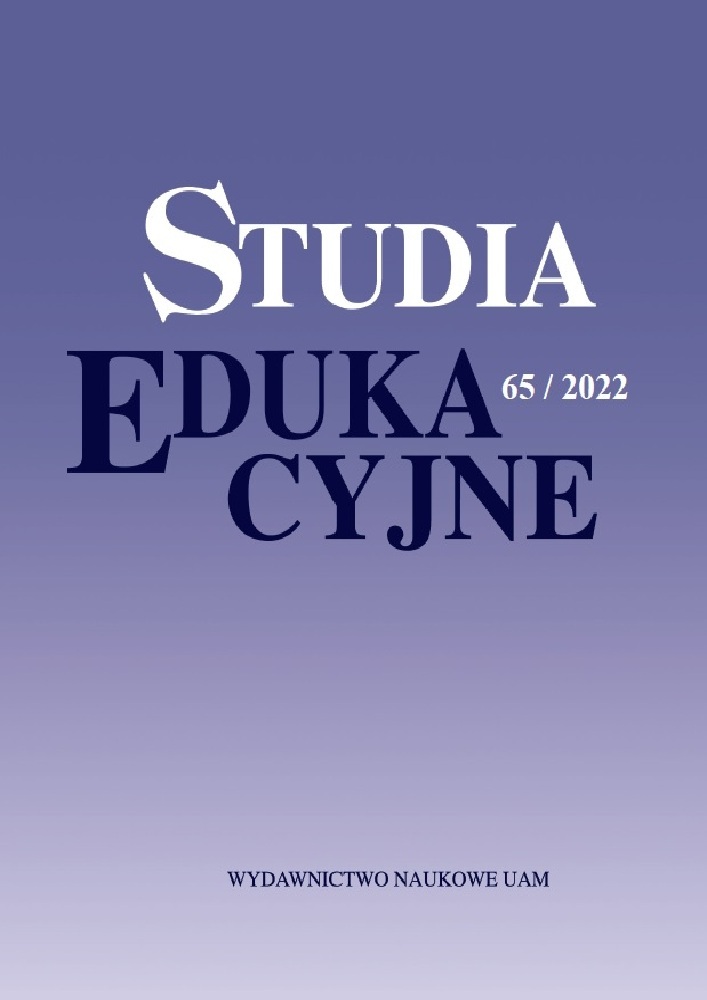Abstract
The topic of analysis is social trust treated as a component of the process of refugees’ social adaptation. Interpersonal and institutional trust is one of the main factors conditioning the quality of civic society and local environments. Their participants are not only people with formal status of citizens but also migrants and their specific group of refugees. Social trust, sense of agency and being located in the structure of social ties and networks are the factors empowering satisfactory social functioning. They are also the components of social adaptation and the subject of concern of the different disciplines of social sciences: educational studies, social psychology and social policy.
References
Baktir Z., Wattson F., Trust-Driven Entrepreneurship for Community Well-Being of Refugees and Their Local Hosts, Journal of Macromarketing, 2021, 41(2). DOI: https://doi.org/10.1177/0276146720935157
Balicki J., Stalker P., Polityka imigracyjna i azylowa. Wyzwania i dylematy, Wydawnictwo Naukowe UKSW, Warszawa 2006.
Benedict R., Wzory kultury, przekł. J. Prokopiuk, Warszawskie Wydawnictwo Literackie Muza S.A., Warszawa 2002.
Blackwell D., Counselling and Psychotherapy with Refugees, Jessica Kingsley Publishers, London – Philadelphia 1988.
CBOS: Zaufanie społeczne. Komunikat z badań nr 43/2020 https://www.cbos.pl/SPISKOM.POL/2020/K_043_20.PDF
Cias C.M., Young R., Barreira P., Loss of Trust: Correlates of the Cormobidityof PTSD and Severe Mental Illness, Journal of Personal and Interpersonal Loss, 2000, 5. DOI: https://doi.org/10.1080/10811440008409747
Довіра соціальним інституціям і партіям: грудень 2020. https://kiis.com.ua/?lang=ukr&cat=reports&id=1005&page=3 [dostęp: 28.04.2022].
Derewienko E., Ilu uchodźców z Ukrainy jest w Polsce? https://300gospodarka.pl/news/uchodzcy-z-ukrainy-w-polsce-liczba [dostęp: 16.05.2022].
Dynamic of trust in social institutions during 2020-2021: the resuts of a telephone survey https://www.kiis.com.ua/?lang=eng&cat=reports&id=1093&page=1
Fazel M., Wheeler J., Danesh J., Prevalence of Serious Mental Disorder in 7000 RefugeesResettled in Western Countries: A Systematic Review, Lancet, 2005, 365. DOI: https://doi.org/10.1016/S0140-6736(05)61027-6
van Gennep A., Obrzędy przejścia, przekł. B. Biały, Państwowy Instytut Wydawniczy, Warszawa 2006.
Herslund L., Everyday life as a refugee in a rural setting – What determines a sense of belonging and what role can the local community play in generating it? Journal of Rural Studies, 2021, 82. DOI: https://doi.org/10.1016/j.jrurstud.2021.01.031
Izha M., Knyazeva O., Pakhomova T., The Problem of Institutional Trust in Ukraine and Europe: A Comparative Analysis, Three Seas Economic Journal, 2020, 1, 4. DOI: https://doi.org/10.30525/2661-5150/2020-4-9
van Hoorn A., Trust Radius versus Trust Level: Radius of Trust as a Distinct Trust Construct, American Sociological Review, 2014, 79(6). DOI: https://doi.org/10.1177/0003122414555398
Кожен третій українець вважає, що покидати дім і рідних зараз — неправильно. Опитування. https://gradus.app/documents/204/%D0%9F%D0%BE%D0%BA%D0%B8%D0%B4%D0%B0%D1%82%D0%B8_%D0%B4%D1%96%D0%BC_%D1%96_%D1%80%D1%96%D0%B4%D0%BD%D0%B8%D1%85_%D0%BD%D0%B5%D0%BF%D1%80%D0%B0%D0%B2%D0%B8%D0%BB%D1%8C%D0%BD%D0%BE__%D0%B4%D0%BE%D1%81%D0%BB%D1%96%D0%B4%D0%B6%D0%B5%D0%BD%D0%BD%D1%8F_Gradus_KSE_18_4_2022.pdf [dostęp: 20.04.2022].
Lalak D. (red.), Migracja, uchodźstwo, wielokukturowość. Zderzenie kultur we współczesnym świecie, Wydawnictwo Akademickie Żak, Warszawa 2007.
Luhmann N., Familiarity, Confidence, Trust: Problemas and Alternatives, [w:] Trust: Making and Breaking Cooperative Relations, red. D. Gambetta, Basil Blackwel, Oxford – Cambridge 1988.
Lyyitinen E., Refugees’ „Journeys of Trust”: Creating an Analytical Framework to Examine Refugees’ Exilic Journeys with Focus on Trust, Journal of Refugee Studies, 2017, 30, 4. DOI: https://doi.org/10.1093/jrs/few035
Masłyk T., Uogólnione zaufanie i jego instytucjonalne korelaty. Kontekst europejski, Studia Socjologiczne, 2021, 3.
Mathiesen T., Cele S., „Doing Belonging”: young former refugees and their active engagemnet with Norwegian local communities, Fenia, 2020, 198, 1-2. DOI: https://doi.org/10.11143/fennia.83695
Misztal B.A., Trust in Modern Societies. The Search for the Bases of Modern Order, Polity Press, Cambridge – Oxford – Malden 1996.
Morina N., Sulaj V., Schnyder U., Klaghofer R., Müller J., Martin-Sőlch R., Rufer R., Obsessive-Compulsive and Posttraumatic Stress Symptoms Among Civilian Survivors of War, BMC Psychiatry, 2016, 16. DOI: https://doi.org/10.1186/s12888-016-0822-9
Nicolais C., Perry J.M., Modesti C., Talamo A., Nicolais G., At Home: Place Attachment and Identity in an Italian Refugee Sample, International Journal of Environmental Research and Public Health, 2021, 18. DOI: https://doi.org/10.3390/ijerph18168273
Rocznik Statystyczny Rzeczypospolitej Polskiej. Główny Urząd Statystyczny, Warszawa 2021.
Silove D., Sinnerbrink I., Filed A., Manicavasagar V., Steel Z., Anxiety, Depression and PTS in Asylum-Seekers: Associations with Pre-Migration Trauma and Post-Migration Stresssors, British Journal of Psychiatry, 1997, 170, 4. DOI: https://doi.org/10.1192/bjp.170.4.351
Szlendak T., Zaufanie, [w:] Fundamenty dobrego społeczeństwa. Wartości, red. M. Bogunia-Borowska, Wydawnictwo Znak, Kraków 2015.
Sztompka P., Kulturowe imponderabilia szybkich zmian społecznych: zaufanie, lojalność, solidarność, [w:] Imponderabilia wielkiej zmiany. Mentalność, wartości i więzi społeczne czasów transformacji, Wydawnictwo Naukowe PWN, Warszawa – Kraków 1999.
Tamilina L., Capturing Sources and Patterns of Social Trust Formation in Ukraine. https://voxukraine.org/en/capturing-sources-and-patterns-of-social-trust-formation-in-ukraine/ [dostęp: 25.04.2022].
Ukraine Special Initiative for Mental Health Situational Assessment. Global Mental Health. https://cdn.who.int/media/docs/default-source/mental-health/who-special-initiative-country-report---ukraine---2020.pdf?sfvrsn=ad137e9_4 [dostęp: 16.05.2022].
Welch M.R., Rivera R.E.N., Conway B.P., Yonkoski J., Lupton P.M., Giancola R., Determinants and Consequences of Social Trust, Sociological Inquiry, 2005, 75, 4. DOI: https://doi.org/10.1111/j.1475-682X.2005.00132.x
W Polsce jest zaledwie 4 tys. psychiatrów, a potrzeba ich kilkukrotnie więcej. Brakuje przede wszystkim psychiatrów dziecięcych; https://biznes.newseria.pl/news/w-polsce-jest-zaledwie-4,p1352532508
Yu M., Reyes L., Malik S., Khetarpal R.M., Steiner J.S., Reciprocity among forced migrants: refugee ana asylees as agents of facilitating integration and community-building for self and others in the United States, Journal of Ethnic and Migration Studies, 2021. DOI: https://doi.org/10.1080/1369183X.2021.1953377


